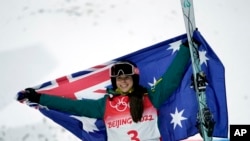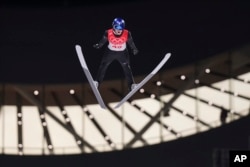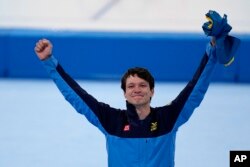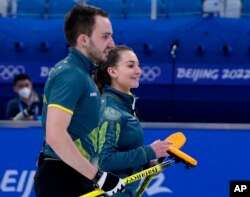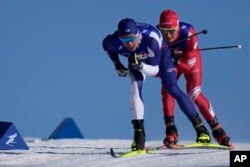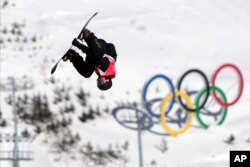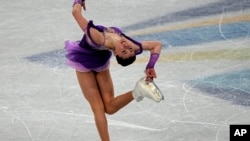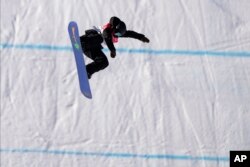The Latest on the Beijing Winter Olympics:
Jakara Anthony of Australia has captured the women’s moguls title at the Beijing Olympics.
Anthony’s back flip with a grab at the bottom of the course sewed up the gold medal Sunday on the Secret Garden Olympic course. Her score of 83.09 edged American Jaelin Kauf, who had been poised to pick up the first gold medal for Team USA in China.
Russian athlete Anastasiia Smirnova earned the bronze while defending champion Perrine Laffont of France finished fourth.
The 23-year-old Anthony joins Dale Begg-Smith as the only Aussies to win the Olympic event. Begg-Smith earned his title at the 2006 Turin Games.
Skiing Jumping
Ryoyu Kobayashi of Japan won the Olympic ski jumping gold medal on the normal hill on Sunday.
Kobayashi jumped last and best, clearing 99.5 meters (326 feet) and had 129.6 points thanks to his graceful style from start to finish.
Manuel Fettner of Austria won silver and Dawid Kubacki of Poland earned bronze.
Two-time ski jumping gold medalist Andreas Wellinger is missing from the Beijing Games because he tested positive for COVID-19 last week, clearing the way for a new champion.
Earlier, Turkish ski jumper Fatih Arda İpcioğlu refused to say if the crescent and star on his blue skis was a statement in support of China’s Uyghur community. The design on the skis used Saturday seemingly represented East Turkestan, the region home to Uyghurs.
“I don’t want to answer about those questions,” İpcioğlu said Sunday after jumping in the first round.
İpcioğlu finished 36th in the 50-jumper field.
Human rights groups say the Beijing government has oppressed members of the Uyghur Muslim minority on a massive scale. China denies the accusations.
Speedskating
Nils van der Poel gave Sweden its first Olympic speedskating medal since 1988, pulling off a stunning comeback to win gold in the 5,000 meters at the Beijing Olympics.
Van der Poel was a big favorite coming into the event as the reigning world champion with an undefeated record in the distance events on this season's World Cup circuit.
He lived up to the hype in the 12 1/2-lap race at the Ice Ribbon oval, turning on the speed at the end to overcome Patrick Roest of the Netherlands with an Olympic record of 6 minutes, 8.84 seconds.
Roest had skated about an hour earlier in the sixth of 10 pairs, initially breaking the Olympic mark in 6.09.31.
Then he nervously watched in the workout room as one pair after another failed to take down his time.
It looked as though van der Poel would come up short, too, as he fell 2 seconds behind Roest's pace with just three laps to go.
Then the Swede kicked it into another gear.
He thrilled the sparse crowd by slicing into Roest's time with each stride. Turns out, van der Poel had just enough time to win gold.
The bronze went to Norway's Hallgeir Engebraaten in 6:09.88.
Sven Kramer's quest for a fourth straight speedskating gold medal in the 5,000 meters ended quickly.
The 35-year-old Dutchman skated in the first pair of the day at Beijing's Ice Ribbon and finished the grueling race in 6 minutes, 17.04 seconds. Two pairs later, both skaters posted faster times.
Kramer was the first male skater to win the same event at three straight Olympics, but he's no longer the world's dominant long-distance performer at the oval. Four years ago, he won gold at Pyeongchang in 6:09.76.
Kramer plans to retire after the Beijing Games, but he still has a couple of events to go. He'll also compete in the mass start and team pursuit.
No matter what, Kramer is already assured of leaving the sport as the most decorated speedskater in Olympic history with nine medals over the last four Olympics, including four golds.
Curling
The Australian mixed doubles curling team of Dean Hewitt and Tahli Gill pulled off a dramatic first win in their first Olympics when they beat Switzerland hours after it appeared they would be headed home because Gill returned a series of positive COVID-19 tests.
Greeted by an occasional chant of “Aussie Aussie Aussie!” by a spectator in the mostly empty Ice Cube, Hewitt and Gill beat Switzerland's Martin Rios and Jenny Perret 9-6. Gill had the big knockout shot to secure a 3-end, or three points, in the sixth end to tie the game at 6-6.
The first-ever Olympic curling team from Australia improved to 1-7. Their final game is against their coach, defending gold medalist John Morris of Canada and his new partner, Rachel Homan.
The Australian Olympic Committee announced earlier in the day that Gill and Hewitt would be heading home after Gill, who had COVID-19 before the games, returned a series of positive tests. But the committee said the Medical Expert Panel determined Gill's levels fell within an acceptable range. Gill said she was not infectious.
The Aussies got a call about an hour before the game that they could play and jumped into a cab to get to the venue. Gill said she had to grab her uniform out of her suitcases, which were already packed.
Cross-Country Skiing
Russian skier Alexander Bolshunov pulled away from the pack early to win gold in the 30-kilometer skiathlon.
Bolshunov, the World Cup points leader in distance races, grabbed a Russian Olympic Committee flag in the final stretch and waved it in the air as he crossed the finish line in 1 hour, 16 seconds.
Bolshunov and Iivo Niskanen of Finland led the race through the first four classic ski laps but Russia's Denis Spitsov passed Niskanen once they were on the freestyle legs.
Spitsov stayed out front and secured the silver, 1 minute, 11 seconds behind Bolshunov. Niskanen held on for the bronze 2 minutes back.
Snowboarding
Chinese teenager Su Yiming had the surprise top score in the men's Olympic slopestyle qualifying round.
Throwing a triple cork, the sort of trick most riders save for finals, Su finished with a score of 86.80. It topped his idol, Mark McMorris of Canada, and defending Olympic champion Red Gerard, who also both advanced to Monday's final.
The 17-year-old Su clapped his hands in excitement after finishing his first-round run as a sparse audience in the stands cheered. Su won a big air competition in Steamboat Springs, Colorado, in December. His best slopestyle finish on the World Cup circuit was sixth on New Year's Day.
Gerard wound up fifth in qualifying and McMorris second. The top 12 riders moved on.
Alpine Skiing
Alpine skiing's power couple will have a busy day on the Olympic slopes - as long as the wind calms down, that is.
Mikaela Shiffrin and Aleksander Aamodt Kilde are now both supposed to race Monday after the men's downhill was pushed back a day because of too-strong gusts at the scheduled start Sunday. Shiffrin and Kilde are dating.
Kilde is considered the man to beat in the downhill. The Norwegian leads the World Cup standings in that event and was fastest during training in China on Friday.
Shiffrin is the defending Olympic champion in the women's giant slalom, which already was on the Alpine program for Monday.
The two-leg GS will be raced at 9:30 a.m. and 2:30 p.m. on the technical slope at Yanqing Alpine Skiing Center. In between those runs, the downhill will be held at noon on the speed slope about a half-mile away.
The Australian mixed doubles curling team received a late reprieve and returned to competition at the Beijing Olympics after an earlier announcement that it would head home after Tahli Gill returned a series of positive COVID-19 tests.
The Australian Olympic Committee said Gill and Dean Hewitt could continue under the close contact provisions.
“We are thrilled for Tahli and Dean and I am delighted that our headquarters team continued pressing her case, after earlier advice that the pair could no longer compete,” said Geoff Lipshut, head of the Australian delegation.
Gill and Hewitt, representing Australia's first-ever Olympic curling team, were back at the Ice Cube in time to play Switzerland in the round robin competition. They are winless in seven games.
Gill contracted COVID-19 prior to the games. Ongoing testing alternated between negative and positive. She had been allowed to compete under the close contact arrangements after discussions with the IOC and games organizers. The AOC said earlier Sunday that initial attempts to return Gill to competition were rebuffed by the IOC and health authorities.
The International Olympic Committee says Olympic officials will meet with Netherlands state broadcaster NOS, which has been frustrated by fallout from its journalist being manhandled by a games security official during a live report.
NOS, which pays rights fees for the Beijing Olympics, disputed comments made Saturday by an IOC spokesman that it was contacted about the incident.
In a rare public criticism of the IOC by an official rights holder, NOS said none of its management nor reporter Sjoerd Den Daas had spoken to anyone from the Olympic body.
China-based Den Daas was pushed away from the camera by the guard while broadcasting live on Friday evening before the opening ceremony.
IOC spokesman Mark Adams clarified that contact with NOS on Friday and Saturday was through the Olympic broadcasting subsidiary, and that a meeting scheduled Sunday “should be the end of the matter.”
Olympic organizers say they're addressing complaints about isolation conditions for athletes who test positive for the coronavirus and working to ensure they have clean rooms, better food and access to training equipment.
“These are exactly the kind of things we have to address. It's a duty. It's a responsibility. We have to make sure that the expectations are met,” said Christophe Dubi, the International Olympic Committee's executive director for the Games.
The comments came after multiple complaints about the isolation conditions. The German team called the situation for its athletes “unreasonable” and said rooms should be bigger and cleaner.
Russian biathlon competitor Valeria Vasnetsova said she couldn't stomach most of the food she was given, and mostly survived on a few pieces of pasta. Soon after the post, a team spokesperson posted a picture showing what he said was improved food, including salmon, cucumbers, sausages and yogurt.
A total of 363 people inside the Olympic bubble have tested positive for COVID.
Figure Skating
The powerful Russian figure skating team is in first place in the team competition at the Beijing Games after a winning performance from world champion Kamila Valieva and another strong skate from Mark Kondratiuk.
The team representing the Russian Olympic Committee has 45 points, two ahead of the U.S., which had a couple of shaky performances from Karen Chen and Vincent Zhou to slip out of first place.
The biggest surprise on the second of three days of team competition was Japan. Wakaba Higuchi was second in the women's short program before 18-year-old Yuma Kagiyama delivered a personal-best score of 208.94 points to easily win the men's free skate, sending the Japanese team into medal contention with 39 points.
The team competition concludes Monday with the women and pairs free skate and the free dance.
Snowboarding
Zoi Sadowski Synnott won New Zealand's first gold medal in Winter Olympics history, stomping down a pressure-packed run on her last trip down the mountain Sunday to win the title in women's slopestyle.
The 20-year-old was one of the very few to put down a clean run on a supersized course, where hardpacked snow and bone-cold wind chills made things difficult for all 12 finalists, including two-time defending champion Jamie Anderson, who finished ninth.
Sadowski Synnott went into her last of three runs trailing American Julia Marino but came up big.
She landed a double-cork 1080 on the second jump, and while not repeating that jump the way she did when she won the Winter X Games last month, her backside 1080 off the final kicker was more than enough.
She raised her hands in the air after landing, knowing what she'd done. Marino and third-place finisher Tess Coady of Australia knew it, too. They gang-tackled her at the finish line to celebrate.




